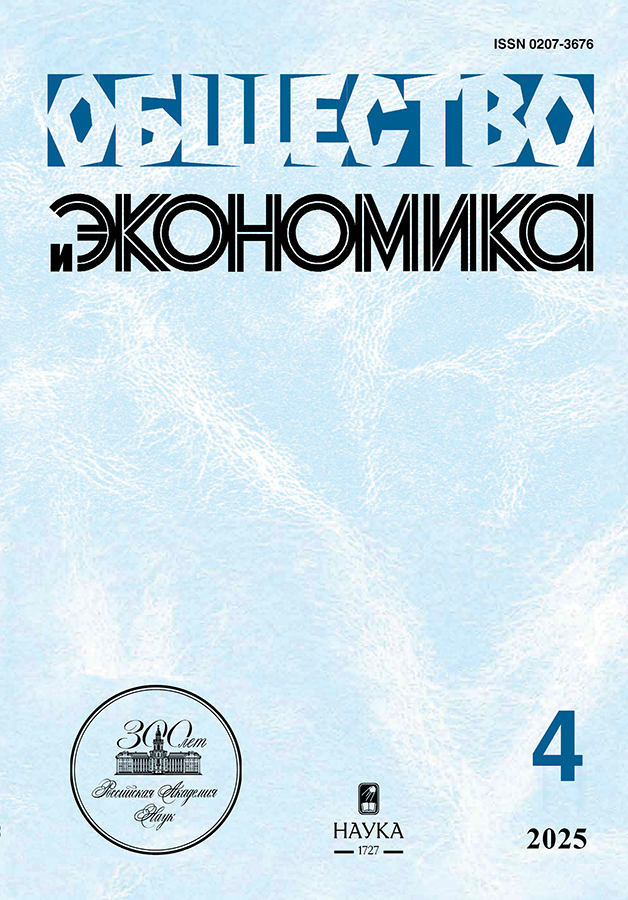Анализ управления знаниями в консалтинге в условиях реорганизации
- Авторы: Архипов А.1, Днепровская Н.2
-
Учреждения:
- НИУ Высшая школа экономики
- Финансовый университет при Правительстве Российской Федерации
- Выпуск: № 4 (2025)
- Страницы: 19-35
- Раздел: ВОПРОСЫ ЭКОНОМИЧЕСКОЙ ПОЛИТИКИ
- URL: https://bioethicsjournal.ru/0207-3676/article/view/682863
- DOI: https://doi.org/10.31857/S0207367625040024
- ID: 682863
Цитировать
Аннотация
В статье проводится анализ практик управления знаниями российских консалтинговых компаний по обеспечению устойчивости своего интеллектуального капитала в условиях выхода из глобальных сетей международного бизнеса. Исследование основывается на данных официальной статистики и отчетов, а также интервью с руководителями российских консалтинговых компаний. После ухода с российского рынка международных консалтинговых компаний их российские подразделения продолжили свою деятельность в реорганизованном виде, частично сохранив человеческий и социальный капитал. Компенсировать утраченный доступ к международным базам знаний и центрам компетенций помогает развитие поглощающей способности. Подтверждено сохранение критически важных элементов поглощающей способности для управления знаниями в российских консалтинговых компаниях, выявлены приоритетные области для развития интеллектуального капитала – приобретение и освоение знаний.
Полный текст
Об авторах
Алексей Архипов
НИУ Высшая школа экономики
Email: aaarkhipov@hse.ru
преподаватель Высшей школы бизнеса
Россия, МоскваНаталья Днепровская
Финансовый университет при Правительстве Российской Федерации
Автор, ответственный за переписку.
Email: navdneprovskaya@fa.ru
профессор кафедры бизнес-информатики
Россия, МоскваСписок литературы
- Андреева Т., Гаранина Т. Влияние интеллектуального капитала на результаты деятельности российских производственных компаний // Форсайт. 2017. № 11 (1). С. 31–40. URL: https://doi.org/10.17323/2500-2597.2017.1.31.40
- Симонова В.Л., Шакута А.С. Структура интеллектуального капитала фирмы // Журнал экономической теории. 2019. № 16 (1). С. 181–186. URL: https://cyberleninka.ru/article/n/struktura-intellektualnogo-kapitala-firmy
- Ahmed S.S., Guozhu J., Mubarik S., Khan M., Khan E. Intellectual capital and business performance: the role of dimensions of absorptive capacity // Journal of Intellectual Capital. 2020. № 21 (1). Р. 23–39. URL: https://doi.org/10.1108/JIC-11-2018-0199/FULL/HTML
- Arora A., Cohen W.M., Cunningham C.M. Inventive Capabilities in the Division of Innovative Labor. 2018. URL: https://doi.org/10.3386/W25051
- Balle A.R., Oliveira M., Curado C.M.M. Knowledge sharing and absorptive capacity: interdependency and complementarity // Journal of Knowledge Management. 2020. № 24 (8). Р. 1943–1964. URL: https://doi.org/10.1108/JKM-12-2019-0686/FULL/HTML
- Bhawe N., Zahra S. Decomposing the knowledge structures of absorptive capacity. В V. Gupta, A. Goktan, G. Shirkova, & A. Karna (Ред.). Research Handbook on Strategic Entrepreneurship. 2022. Р. 8–23. Elgar. URL: https://www.elgaronline.com/edcollchap/edcoll/9781789904437/9781789904437.00006.xml
- Chatterjee S., Chaudhuri R., Vrontis D. Knowledge sharing in international markets for product and process innovation: moderating role of firm’s absorptive capacity // International Marketing Review. 2022. № 39 (3). Р. 706–733. URL: https://doi.org/10.1108/IMR-11-2020-0261/FULL/HTML
- Chen J. Outlook on knowledge management: The origin and basic framework of knowledge management. The Routledge Companion to Knowledge Management. 2022. Р. 3–14. URL: https://doi.org/10.4324/9781003112150-2/OUTLOOK-KNOWLEDGE-MANAGEMENT-JIN-CHEN
- Cohen W.M., Levinthal D.A. Absorptive Capacity: A New Perspective on Learning and Innovation // Source: Administrative Science Quarterly. 1990. № 35 (1). Р. 128–152.
- Dzhengiz T., Niesten E. Competences for Environmental Sustainability: A Systematic Review on the Impact of Absorptive Capacity and Capabilities // Journal of Business Ethics. 2020. № 162 (4). Р 881–906. URL: https://doi.org/10.1007/S10551-019-04360-Z
- Engelman R.M., Fracasso E.M., Schmidt S., Zen A.C. Intellectual capital, absorptive capacity and product innovation // Management Decision. 2017. № 55 (3). Р. 474–490. URL: https://doi.org/10.1108/MD-05-2016-0315/FULL/HTML
- Escribano A., Fosfuri A., Tribó J.A. Managing external knowledge flows: The moderating role of absorptive capacity // Research Policy. 2009. № 38 (1). Р 96–105. URL: https://doi.org/10.1016/J.RESPOL.2008.10.022
- Hussinki H., Garanina T., Dumay J. Intellectual capital research: European versus North American approaches. Research Handbook on Intellectual Capital and Business. 2021. Р. 71–86). Edward Elgar Publishing Ltd. URL: https://doi.org/10.4337/9781785365324.00011
- Khaksar S.M.S., Chu M.T., Rozario S., Slade B. Knowledge-based dynamic capabilities and knowledge worker productivity in professional service firms. The moderating role of organisational culture // Knowledge Management Research and Practice. 2023. № 21(2). Р. 241–258. URL: https://doi.org/10.1080/14778238.2020.1794992
- Lichtenthaler U. Digitainability: The combined effects of the megatrends digitalization and sustainability // Journal of Innovation Management. 2021. № 9 (2). Р. 64–80. URL: https://doi.org/10.24840/2183-0606_009.002_0006
- Lichtenthaler U., Lichtenthaler E. Technology transfer across organizational boundaries: Absorptive capacity and desorptive capacity // California Management Review. 2011. № 53 (1). Р. 154–170. URL: https://doi.org/10.1525/CMR.2010.53.1.154
- Mamedova I.A., Savchenko-Belsky V., Velesco S. Management Consulting in Digital Era. Lecture Notes in Networks and Systems. 397 LNNS. 2022. Р. 430–437. URL: https://doi.org/10.1007/978-3-030-94873-3_54
- Mckenna C.D. The World’s Newest Profession: Management Consulting in the Twentieth Century // Enterprise & Scociety. 2001. № 2 (4). Р. 673–679. URL: https://doi.org/10.1093/es/2.4.673
- Oliveira M., Curado C., Balle A.R., Kianto A. Knowledge sharing, intellectual capital and organizational results in SMES: are they related? // Journal of Intellectual Capital. 2020. № 21 (6). Р. 893–911. URL: https://doi.org/10.1108/JIC-04-2019-0077/FULL/HTML
- Sokolov D., Zavyalova E. Human Resource Management in Professional Service Firms: a Systematic Literature Review. 2017. URL: https://dspace.spbu.ru/bitstream/11701/8599/1/WP_7(E)-2017_Sokolova_Zavyalova.pdf
- Song Y., Gnyawali D.R., Srivastava M.K., Asgari E. In Search of Precision in Absorptive Capacity Research: A Synthesis of the Literature and Consolidation of Findings // Journal of Management. 2018. № 44 (6). Р. 2343–2374. URL: https://doi.org/10.1177/0149206318773861
- Stewart T.A. Intellectual Capital: The new wealth of organization. Doubleday. 1997. URL: https://books.google.com/books/about/Intellectual_Capital.html?hl=da&id=3eDtAAAAMAAJ
- Teece D.J., Pisano G., Shuen A. Dynamic capabilities and strategic management // Strategic Management Journal. 1997. № 18 (7). Р. 509–533. URL: https://doi.org/10.1002/(SICI)1097-0266(199708)18:7<509::AID-SMJ882>3.0.CO;2-Z
- Tuncdogan A., Lindgreen A., Volberda H. Strategic renewal: Core concepts, antecedents, and micro foundations. Routledge. 2019. URL: https://books.google.com/books?hl=ru&lr=&id=0zj3DwAAQBAJ&oi=fnd&pg=PP1&dq=Tuncdogan+A.+et+al.+(ed.).,+2019&ots=YDrUgQ2ers&sig=YHvRFHfPM0Q0xTBTYg7kUncnrYM
- Vasconcelos A.C., Martins J.T., Ellis D., Fontainha E. Absorptive capacity: A process and structure approach // Journal of Information Science. 2019a. № 45 (1). Р. 68–83. URL: https://doi.org/10.1177/0165551518775306
- Vasconcelos A.C., Martins J.T., Ellis D., Fontainha E. Absorptive capacity: A process and structure approach // Journal of Information Science. 2019b. № 45 (1). Р. 68–83. URL: https://doi.org/10.1177/0165551518775306
- Wheeler B.C. NEBIC: A dynamic capabilities theory for assessing net-enablement // Information Systems Research. 2002. № 13 (2). Р. 125–146. URL: https://doi.org/10.1287/ISRE.13.2.125.89
- Zahra S.A., George G. Absorptive Capacity: A Review Reconceptualization, and Extension. The Academy of Management Review. 2002. № 27 (2). Р. 185–203. URL: https://doi.org/10.5465/AMR.2002.6587995
Дополнительные файлы











